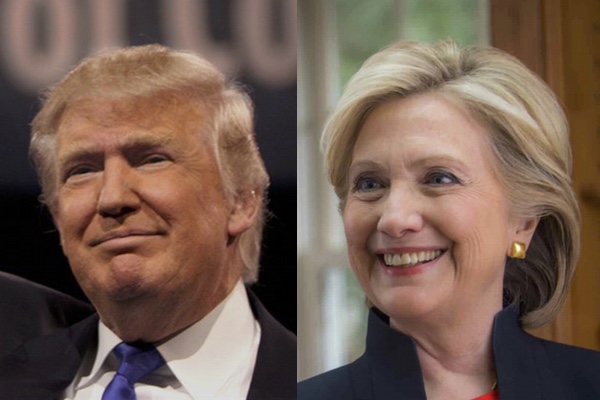Imagining What a President Donald Trump and President Hillary Clinton Would Be Like

For most of 2016, voters have been subjected to media stories too often focused on things only tangentially related to a president’s ability to govern. In our constitutional system, presidential leadership is highly institutionalized and presidents must mobilize support from the bureaucrats, Congress, and the public.
Effective presidential leadership requires many different qualities. In examining whether Donald Trump or Hillary Clinton has the potential for presidential greatness, their skills need to be judged against a set of criteria for effective leadership.
Using political scientist Fred Greenstein’s six criteria for effective leadership, the following observations can be made of Clinton and Trump and how they stack up against historical precedents.
Effective communication. An effective political leader must be able to persuade citizens about policy positions. Franklin Roosevelt and Ronald Reagan used very different rhetorical styles in getting public support. Neither Clinton nor Trump comes close to their persuasive skills.
Hillary Clinton’s public communication style can best be described as efficient. Her speeches are logically organized and demonstrate a thorough understanding of policy issues. Clinton’s rhetoric rarely soars, even in her Democratic National Convention acceptance speech. At her worst, in speeches and interacting with the press, she lacks an emotional connection with her audience and can revert to sarcasm.
Donald Trump favors unscripted communication where his bombastic style can energize supporters and anger critics. His speeches tend to ramble and repeat soundbites rather than make substantive policy arguments. Trump draws energy from his audience and, at his worst, makes unsubstantiated and outrageous comments that divide rather than unify.
Organizational Capacity. An effective president must assemble a strong team and use that team to vet policy positions. Franklin Roosevelt was well known for encouraging his advisors to disagree with one another and him on policy matters, while Dwight Eisenhower encouraged advisors to articulate very different points of view on foreign policy matters. Both Clinton and Trump prefer loyal, but silent, advisors.
Clinton’s loyal advisors can defend her against outside attacks, but they aren’t effective in arguing with Clinton over approach to politics. Having more devil’s advocates might have prevented many of her troubles with her late decision to oppose the Iraq War or her stubbornness in dealing with the email controversy.
In business, Trump values his instincts and hires people to simply carry out his plans. Trump has exhibited disdain for advisors who attempt to change his way of thinking. Only recently with his third campaign manager, Kellyanne Conway, has he exhibited any willingness to follow advice.
Political Skill. Effective presidents recognize that the executive branch is only one part of the federal government and use their interpersonal skills to persuade, cajole, or threaten their way to pass legislation. Lyndon Johnson’s political skills were the most successful in getting a sometimes recalcitrant Congress to pass legislation. Hillary Clinton demonstrated political skill as US senator, while Donald Trump relies on bullying to get results.
As a senator, Clinton demonstrated the ability to work with Democrats and Republicans alike. For example, she worked with Senator Lindsey Graham (R-SC) on legislation rewarding U.S. manufacturing and worked to promote more benefits for the military and keep U.S. bases open.
Policy Vision. Effective presidents often create a consistent, transcendent vision. John Kennedy and Ronald Reagan are two presidents whose policy visions inspired citizens to believe in their leadership.
Clinton often has visionary ideas, such as the health care plan she prepared for her husband’s administration. Too often, however, Clinton retreats from policy positions, like on the Iraq War or the Trans Pacific Partnership, appearing less visionary than opportunistic.
It is rare in presidential politics that a candidate, like Trump, appears to have no policy vision. Trump has relied on his campaign slogan and superlatives about his abilities than on connecting policy statements. Even on the one issue he has staked his campaign on—immigration—Trump vacillates on the means and goals of his policy.
Cognitive Style. Presidents must understand the complexities of policy issues and use vast amounts of information to craft positions on these issues. Even before he entered the White House, Richard Nixon understood the changing dynamics of foreign policy toward the USSR and China and created an innovative approach to move beyond the Cold War policies of earlier presidencies.
Clinton possesses an analytical mind that reduces problems to their component parts. When she studies an issue, Clinton pours over data and talks to experts. Having such an analytical approach can be problematic because, like with her email controversy, it makes her fail to see the broader implications of the policy.
In business and politics, Trump has an intuitive approach to problems. He follows his instinct and does not delve deeply into the intricacies of policies. Trump shows little interest in learning about policy matters, putting a lot of pressure on his advisors who must succinctly analyze issues and provide policy options.
Emotional Intelligence. Effective presidents must manage their emotions. George H. W. Bush and Dwight Eisenhower generally managed their emotions when facing domestic or foreign situations, or on the campaign trail. Richard Nixon, on the other hand, was ruled by his temper and paranoia to the point that it led to his downfall.
Clinton has managed her emotions in public through scandals, investigations, and difficult policy matters. She never appears to make an important decision when angry or frustrated. The emotional intelligence skill that is Clinton’s greatest challenge is demonstrating empathy. Her comments about West Virginia coal miners, for example, created many problems for her.
Trump is often ruled by his anger. After discovering that the Mexican president disclosed that he told Trump that Mexico would never pay for the wall between Mexico and the United States, Trump angrily changed his major policy speech on immigration to reflect the toughest possible stance on immigration and contradict statements Trump made earlier the same day.
While both Clinton and Trump have leadership deficiencies, Trump seemingly lacks every leadership quality associated with presidential greatness.